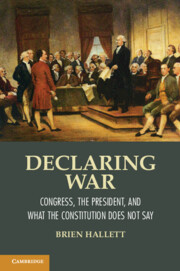Book contents
- Frontmatter
- Contents
- List of Figures
- Acknowledgments
- Prologue
- Miscellaneous Frontmatter
- 1 A Constitutional Tyranny and Presidential Dictatorship
- Part I What Is the History?
- Part II What Is a Declaration of War?
- 5 Declaring and Commanding
- 6 Lawful and Unlawful Declarations of War
- 7 Six Possible Structures
- Part III What Are the Solutions?
- Part IV What Is the Theory?
- Appendix I Five Congressional Declarations of War and One Appropriations Act
- Appendix II The Fœderative Powers in Parliamentary Governments
- References
- Index
6 - Lawful and Unlawful Declarations of War
Quantity over Quality
Published online by Cambridge University Press: 05 November 2012
- Frontmatter
- Contents
- List of Figures
- Acknowledgments
- Prologue
- Miscellaneous Frontmatter
- 1 A Constitutional Tyranny and Presidential Dictatorship
- Part I What Is the History?
- Part II What Is a Declaration of War?
- 5 Declaring and Commanding
- 6 Lawful and Unlawful Declarations of War
- 7 Six Possible Structures
- Part III What Are the Solutions?
- Part IV What Is the Theory?
- Appendix I Five Congressional Declarations of War and One Appropriations Act
- Appendix II The Fœderative Powers in Parliamentary Governments
- References
- Index
Summary
The Congress shall have power … to declare war, grant letters of marque and reprisal, and make rules concerning captures on land and water.
(article I, section 8, clause 11)The domestic political world changes, as it were, the instant that presidents formally decide to engage the enemy.
William G. Howell and Jon C. Pevehouse (2007, xix)By now, it should be clear that the history of declaring of war in the United States is a story of extreme ambiguity and confusion. In terms of the competence of who makes the declaration, of the quality of the texts written, and of the procedures by which the texts are produced, no consistency can be found. For example, even when the Congress meets the minimal constitutional procedures for declaring war, as in 1812, 1917, and 1941, the process is still entirely insufficient because the text lacks all substance. The 1812, 1917, and 1941 declarations are like passing a law saying, “that taxes be increased, and the same is hereby increased, and that the president be, and he is hereby, directed and empowered to use the entire Internal Revenue Service to increase taxes.” Such a law would meet the minimal constitutional criteria for law-making, but most people, not including the president of course, would observe that the text is not really adequate to its purposes. Something important is missing; a necessary specificity is missing. Ideally then, the rule of law requires not only a performative speech act by a competent speaker, attention to proper procedures, but a substantive text as well. Sadly, this chapter catalogues the results of more than two hundred years of inattention to these three elements of the rule of law.
- Type
- Chapter
- Information
- Declaring WarCongress, the President, and What the Constitution Does Not Say, pp. 126 - 145Publisher: Cambridge University PressPrint publication year: 2012



